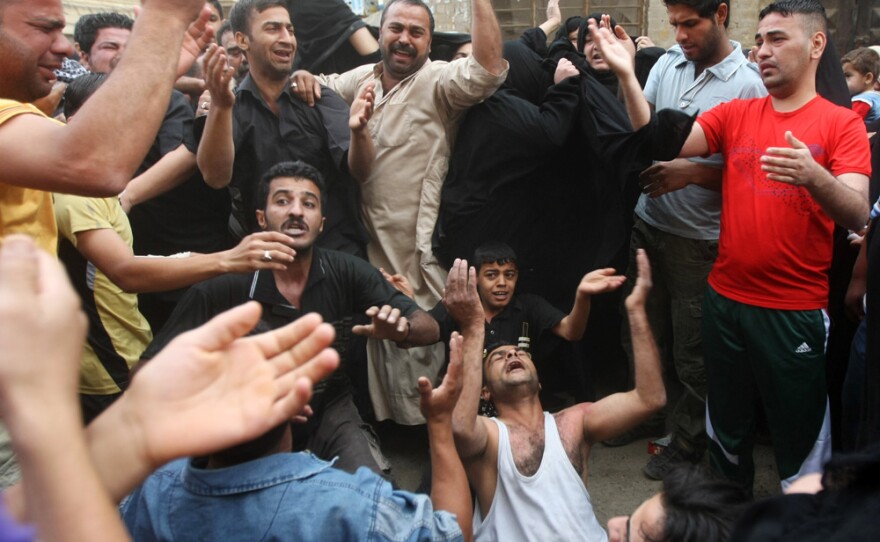Insurgents in Iraq appear to be taking advantage of the political gridlock after the country's March 7 election by launching attacks on the government and civilians. More than 100 people have died in bombings and massacres over the past five days, and Iraqis fear a return to the dark days of sectarian violence.
The killings this week stirred Baghdad's most traumatic memories of the carnage from several years ago. In one suburb, men wearing army uniforms, but most likely imposters, arrived and executed Sunnis off a written list of names. Car bombs struck three embassies, and seven explosions ripped through several neighborhoods Tuesday, killing 50 people and wounding scores.
The only thing the neighborhoods had in common was that they saw terrible violence in the past.
In the south Baghdad neighborhood of Saydia, laborers cleaned up rubble where a bomb partially collapsed a building Tuesday. The neighborhood used to be mixed, with Shiites and Sunnis living side by side. But the civil war forced the two sects to flee onto opposite sides of a divided highway.
Police remained on high alert Wednesday, swarming around a visitor from outside the neighborhood.
Mahmoud Hazim, who witnessed Tuesday's explosion from his barbershop nearby, says the goal of the bombers is clear to him.
"It's no secret many people want the sectarian war back in this country. There's no doubt about it," Hazim says.
So far, though, he and his neighbors say they have no intention of letting the bombs push them back to the bloodletting that killed tens of thousands of Shiites and Sunnis in 2006 and 2007.
Iraqi and American officials are counting on Iraqis to refuse to go along with sectarian violence, says Cameron Munter, charge d'affaires at the U.S. Embassy, who served in Iraq in 2006, during the sectarian war.
"Atmospherically, it's day and night compared to then ... not an enraged atmosphere but a determined atmosphere," he says.
Munter says that through all of the major bomb attacks of the past year, Iraqis have refused to be baited into another civil war. And while the negotiations are fierce over building a governing coalition, Munter says the violence is not intimidating Iraq's politicians either.
"We don't see that they're having an impact on the leadership of the country to move ahead on government formation, and indeed we don't think it's had an impact on the people of the country moving ahead towards their commitment towards a better future," he says.
But near the site of Sunday's bomb in front of the Iranian Embassy, local shopkeepers felt more despair than determination.
Sa'ad Hassan, whose vegetable stand was damaged by the blast, blames the political deadlock for the bombs.
He says it's a lie that al-Qaida is responsible for the bombings. This is between politicians, he says, who are fighting over seats in parliament. Hassan says corrupt officials are allowing car bombs into these sensitive areas, though he doesn't know exactly how the politicians stand to benefit.
The two leading candidates — Prime Minister Nouri al-Maliki and former Prime Minister Ayad Allawi — condemned the bombings, and in some ways they remain in campaign mode.
Maliki announced what he said would be a "doubling" of security in Baghdad, and Allawi announced a blood drive — to which he donated while giving a press statement.
But neither man seems close to announcing a new Iraqi government, which many see as the only hope for stemming the violence.
Copyright 2022 NPR. To see more, visit https://www.npr.org. 9(MDAzMjM2NDYzMDEyMzc1Njk5NjAxNzY3OQ001))







